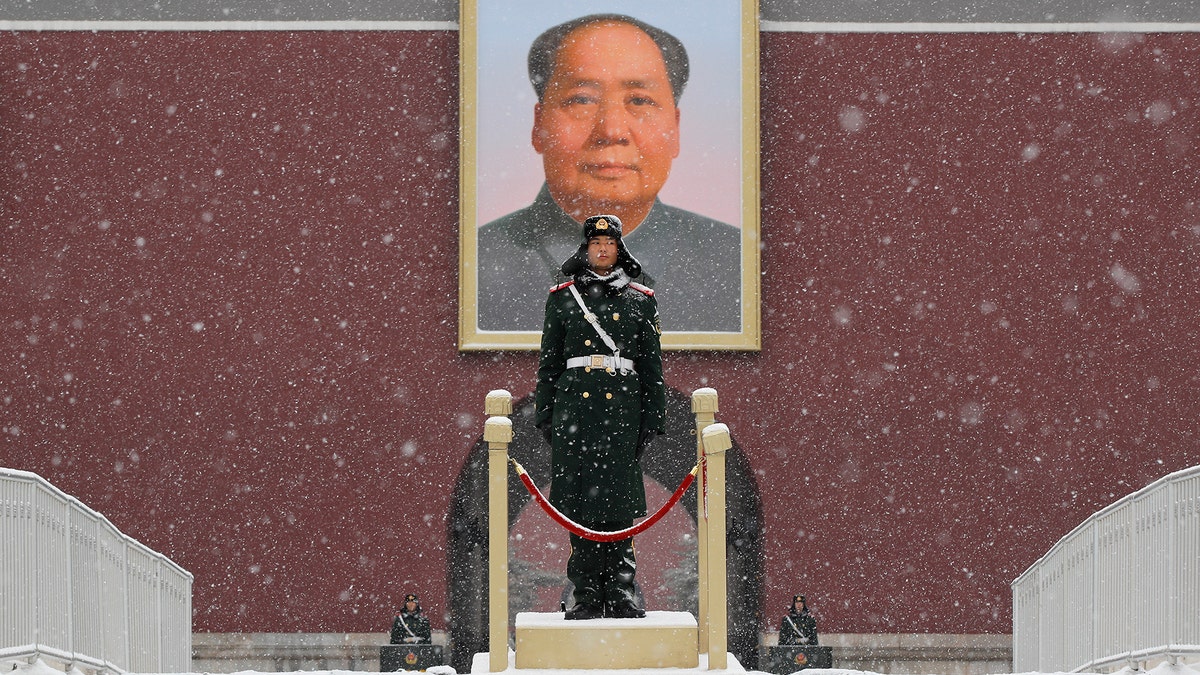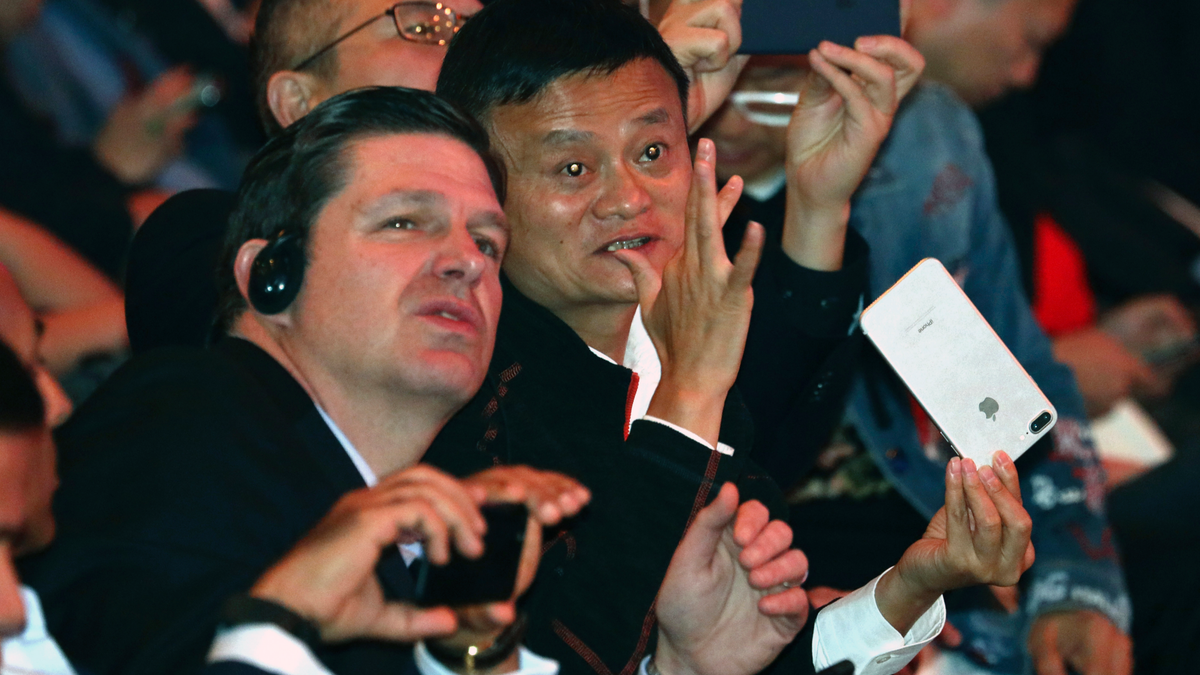Experts fear US is falling behind China in race for AI dominance
China steps up plans for using artificial intelligence to strengthen its military; Bill Hemmer reports.
The President and the Pentagon are signaling that artificial intelligence (AI) is now a major priority for U.S. national security, and competition from China and Russia may be a key motivator.
President Trump issued an executive order on Feb. 11 titled "Maintaining American Leadership in Artificial Intelligence." It's a directive that he says "will affect the missions of nearly all executive departments and agencies," and he didn't mince words on the significance of this quest.
"Continued American leadership in AI is of paramount importance to maintaining the economic and national security of the United States," the executive order reads.
PENTAGON MAKES MASSIVE NEW AI PUSH FOR TANKS, SHIPS, WEAPONS, DRONES AND NETWORKS
A few days later, the Pentagon followed-up with its own AI manifesto focused on "Harnessing AI to Advance Our Security and Prosperity." That strategy document offered a similarly urgent assessment of the state of play when it comes to AI, pointing specifically to the fact that other nations are already heavily invested.
"Other nations, particularly China and Russia, are making significant investments in AI for military purposes... These investments threaten to erode our technological and operational advantages and destabilize the free and open international order."
The DoD strategy argues that the advancement of AI technology will “change the character of the future battlefield and the pace of threats we must face," and that “[o]ther nations, particularly China and Russia, are making significant investments in AI for military purposes.” Those investments, they say, “threaten to erode our technological and operational advantages and destabilize the free and open international order.”
Both directives call for increased research and development, and the rapid cultivation of AI workforces, but at this point, there are no mentions of any new funding to support these efforts. That will come in the form of FY 2020 budget request at both the agency and executive levels, which of course will be subject to congressional approval. And with the DoD and outside experts acknowledging that countries like China and Russia have already been pouring resources into their own AI systems, there is some disagreement as to whether these new directives are doing any good.
'BIG BROTHER': AI PIONEER FEARS CHINA'S USE OF TECHNOLOGY FOR SURVEILLANCE AND CONTROL
Brett Velicovich, a special operations veteran, acknowledged in a recent Fox News op-ed that "[u]nfortunately for America, China’s enormous investment in AI is paying dividends, allowing Beijing to modernize its military capabilities at a dangerously rapid pace." President Trump's new directive, he argues, "serves as a direct response to China’s initiative," and proves "America is now taking the vital quest to develop sophisticated AI capabilities more seriously than ever before."

Chinese paramilitary policemen stand guard under the portrait of former leader Mao Zedong outside the Tiananmen Gate as snow falls in Beijing, Tuesday, Feb. 12, 2019. The Pentagon cited competition from countries like China and Russia in its new strategy document on artificial intelligence. (AP Photo/Andy Wong)
For some, the impact of this new focus still remains to be seen. "The EO is fine as far as it goes in signaling the importance of AI research and applications to American interests," according to Benjamin Boudreaux, a former State Department cyber policy officer who now focuses on issues at the intersection of national security and AI at the RAND Corporation. In an exchange with Fox News, Boudreaux said that while he read the announcements from the Pentagon and the President with great interest, "without any new funding underlying the order, it’s not clear it will itself make much of a difference."
This isn't to say that the President's directive doesn't come without any tangible benefits. Gregory C. Allen, who specializes in AI and diplomatic issues at the Center for a New American Security, tells Fox "there are important actions that will take effect immediately, such as directing federal agencies to determine what government datasets might be useful to American AI researchers and to begin a process for sharing such data."
AI WILL DISPLACE 40 PERCENT OF WORLD'S WORKERS AS SOON AS 2035, LEADING EXPERT WARNS
However, Allen has also been able to peer behind the curtain of China's AI efforts, and it seems clear that their approach to AI is already a few steps ahead.
"China’s diplomats are saying that China fears an AI arms race even as China’s military and defense companies seek to use AI to build a military more advanced than any other in the world."
Allen traveled to China on four separate occasions in 2018 to attend a variety of AI conferences for diplomatic, military and private-sector types and summarized his experience in a report published earlier this month.
"In my interactions with Chinese government officials, they demonstrated remarkably keen understanding of the issues surrounding AI and international security," Allen said. And in addition to keeping a close watch on AI policy discussions as they unfold in the U.S., Allen says "[i]t is clear that China’s government views AI as a high strategic priority and is devoting the required resources to cultivate AI expertise and strategic thinking among its national security community."
CREEPY AI GENERATES ENDLESS FAKE FACES
One of the ways China has publicly displayed its AI ambitions is by designating a few major companies as the country's "AI Champions." In a conversation with Allen, a representative for one of those "AI Champions" argued that the support they are seeing from the Chinese government came in stark contrast to the race between state-owned and private companies to develop nuclear and rocket technology.

Jack Ma, Alibaba's chairman, chats after the start of Alibaba's 11.11 Global Shopping Festival held in Shanghai, China, early Sunday, Nov. 11, 2018. What started out ten years ago as a day of online promotion with US$7.8million in sales has grown into the world's biggest e-commerce event generating US$25.3billion in 2017. (AP Photo/Ng Han Guan)
Allen believes that the comparison of AI to nuclear and rocket technologies by a "Champion" of the Chinese government is proof of the "critical role of AI to the future of national security." And that's not the only sign of how serious this issue is being treated overseas.
Jack Ma, co-founder and chairman of e-commerce giant Alibaba, warned ominously at the World Economic Forum in Davos, Switzerland in January that every world war has begun with a "technology revolution." Alibaba is also among the Chinese government's official "AI Champions."
"China’s diplomats are saying that China fears an AI arms race even as China’s military and defense companies seek to use AI to build a military more advanced than any other in the world," Allen tells Fox.
Boudreaux agrees that America "faces real strategic competition from China and Russia, but... AI should not be viewed as a zero-sum technology but one where there are possibilities for mutual gain."
"Even if one takes an AI arms race perspective, it is important that the US work with its allies to ensure AI is used safely and responsibly."
"Even if one takes an AI arms race perspective, it is important that the U.S. work with its allies to ensure AI is used safely and responsibly," Boudreaux added.
Allen agrees that "China is deeply woven into the global economy," and that our relationship with them is very different than the Cold War dynamic from our nuclear arms race with Russia. That doesn't change the reality of what he says is unfolding overseas, he says.
CLICK HERE TO GET THE FOX NEWS APP
"Despite expressing concern on AI arms races," Allen argues, "most of China’s leadership sees increased military usage of AI as inevitable and is aggressively pursuing it."





















